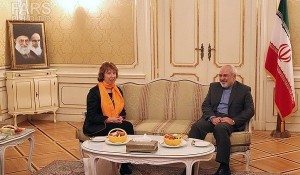 Iranians are expressing more optimism than their U.S. and European counterparts as international negotiations resume over the Islamic Republic’s disputed nuclear program.
Iranians are expressing more optimism than their U.S. and European counterparts as international negotiations resume over the Islamic Republic’s disputed nuclear program.
In the final push to reach a deal before a self-imposed Nov. 24 deadline, each side in the negotiations between Iran and six world powers is making the case that an accord is still possible, if only the other side would act reasonably when the talks resume today in Vienna.
An accord would place curbs on Iran’s nuclear program in return for easing or lifting economic sanctions that have hobbled its economy. Russia has emerged as a potential linchpin if the two sides can agree for Iran to ship enriched uranium out of the country for the Russians to fabricate into fuel for nuclear reactors.
Even so, Russia’s chief negotiator, Deputy Foreign Minister Sergei Ryabkov, said in an interview that his government sees no sign of political will in either Iran or the U.S. to make the concessions required for a deal.
“We have no evidence that the necessary decisions have been taken in the major capitals,” Ryabkov said.
U.S. officials, who spoke on condition of anonymity to discuss the closed-door talks, said gaps remain even after some progress that stemmed from last week’s meeting between Secretary of State John Kerry and Iranian Foreign Minister Mohammad Javad Zarif in Oman.
Kerry, who plans to join the talks in Vienna later this week, is scheduled to meet in London today with Oman’s foreign minister, who has just visited Tehran.
Extending Talks
One of the Americans said it would be possible to get an agreement sealed on Nov. 24, but only if tough decisions are taken by Iran’s leaders.
Officials interviewed from the U.S., France, Germany and the U.K., say the two sides haven’t discussed extending the talks because they want to stay focused on delivering a solution by next week’s deadline, one year after an interim accord was reached in Geneva.
Extending the talks for a second time -- after doing so in July -- would pose its own difficulties. Republicans who take control of the U.S. Senate in January and hard-liners in Tehran opposed to any compromise may throw up obstacles to negotiations if talks continue without at least an agreement in principle before the end of the year.
In Iran, public messaging over the likelihood of a deal has been more positive than in the U.S. or Europe.
If the nations negotiating with Iran act in a “logical” fashion, an accord can be reached, said Ali Shamkhani, secretary of the Supreme National Security Council of Iran, who was quoted in the Shargh newspaper.
Iranian Prediction
Tehran University professor Sadegh Zibakalam, who is seen as close to President Hassan Rouhani’s government, predicted negotiations will succeed and yield a deal that’s good for Iran, according to the Islamic Student News Agency.
With the negotiations taking place in secret, there’s no way for the public to know how much to read into the public statements of any of the participants.
Trita Parsi, founder of the National Iranian-American Council, said Iran’s leadership may be speaking positively to prepare the population for significant concessions necessary to get a deal -- or in an attempt to convey that Iran meant well.
“Sometimes Iran has been very optimistic in the media, which is partly aimed at presenting themselves as very flexible, to send the message that if talks fail, it’s because of the Americans,” said Parsi, author of “A Single Roll of the Dice: Obama’s Diplomacy with Iran.”
Missed Opportunities
Iran says its nuclear program is solely for civilian energy and medical research. The U.S. and its international partners have said Iran is secretly seeking a nuclear weapons capability.
John Limbert, a former senior adviser on Iran at the U.S. State Department, said he fears the last year of nuclear negotiations may only add to a history of missed chances for the two sides over the past 35 years.
“It’s possible that at the end we’re going to look back at this as another opportunity that was lost, when either hard-liners -- opponents on both sides -- scuttled the deal, or the prevailing mistrust simply wouldn’t let the two sides get to an agreement,” said Limbert, who was a hostage in the U.S. embassy during the 1979 Iranian Revolution and is now a professor at the U.S. Naval Academy in Annapolis, Maryland.
Eleventh Hour
Laicie Heeley, director of Middle East and defense policy at the Center for Arms Control and Nonproliferation in Washington, is one of few U.S. analysts who express optimism that a deal may be reached by next week.
“It does look like they should be able to come to one, but both sides are going to have to make some tough choices in the days ahead,” she said on a conference call organized by the Washington-based National Security Network. “I don’t expect any large breakthroughs to happen until at least the 11th hour.”
In Iran, different political factions have been voicing support for an accord.
Ismail Kowsari, a member of the Iranian parliament’s National Security and Foreign Policy Committee, said the “principalists,” a conservative political faction, “have confidence in the negotiating team and support them,” according to the Iranian Tasnim news agency.
Heeley, of the arms control center, said the public and private messaging makes it unwise to stake bets.
“Anything being said publicly could be meant to influence negotiations, and it all should all be taken with a grain of salt,” she said.
By Bloomberg
The Iran Project is not responsible for the content of quoted articles.

 QR code
QR code